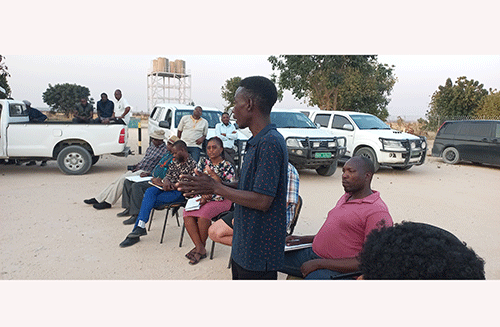NDONGA LINENA – Workers at the Ndonga Linena government irrigation project have blamed government for their unproductive four years. The irrigation project, which was under the management of Agribusdev, has since 2019 not produced anything. Ndonga Linena is one of 11 government green-scheme irrigation projects, and is situated about 78km east of Rundu.
The farm manager Janno Rentel on Wednesday informed the Parliamentary Standing Committee on Natural Resources, that during the past four years, the farm has not received any budget for maintenance or for new equipment, hence they could not make use of farm implements. As such, some 32 workers have just been receiving their salaries without earning it.
The standing committee is under the chairmanship of Swapo member of parliament Tjekero Tweya.
“The only money budgeted was for inputs, to buy seeds, fertilisers, fuel but no budget for maintenance or to buy new implements. Implements are not functioning properly, especially our planter, sprayer and tractors. We don’t even have a budget to repair and do maintenance since 2019 and we can’t do anything,” said Rentel.
The farm manager told the committee members when they visited the State farm that the pump station, which supplied water to crops, is out of order and was not repaired due to lack of funds from the State. Also, centre pivots along with the water pump station at the heart of the project are also not in working condition, as they have not been serviced since 2010.
At the moment, only one pump is working out of six pumps and even this is not working effectively, the manager said.
“Silos are also not in working order,” said Rentel, who has been the project manager for the past two years.
“Currently, we propose that government should at least fix the phase one pump station and phase one pivots then we will be able to cultivate at least 132 hectares of commercial and 162 hectares of small-scale farms,” Rentel noted.
The manager further informed the committee that small-scale farmers at the project are also drowning in debts.
They owe the farm as well as Agribank that usually provides them with input loans. Due to unproductivity at the farm, this situation has been made worse as farmers have not paid their dues to the service provider or the bank.
Rentel added that Agribank could not provide the current 24 small-scale farmers with loans due to the broken pump station which increases their risk of defaulting on loans.
“From 2019 when problems started at the farm, Agribank stopped giving us loans, because we are unable to pay back. Why? Because of the poor management by Agribusdev who is unable to repair the tractors, water pumps and everything,” said Booysen Mutelo, a small-scale farmer at Ndonga Linena.
“Since 2019, most of us didn’t have any crops in the field because we were still having outstanding loans with Agribank. The outstanding is still accumulating interest and penalties. The only way we can pay is if we produce. In 2020, we were blacklisted and it is not our will not to produce. That is Agribusdev,” Mutelo noted.
Another challenge for small-scale farmers is the electricity for which they are being charged maximum demand and not pay as you use. “For four years we are not producing anything but we are being charged maximum demand average of N$2000 per month, and for four years of non-payment, each of us now owe about N$200 000. While we are not in production, we don’t know where we are going to get that money. We don’t have any subsidy from anywhere,” said Mutelo.
“The only source of income we get is from crop production. If from 2019 to now we did not produce, how are we surviving? We were rejected on drought relief food programme because we produce food but since 2019 the service provider has not provided the platform,” Mutelo lamented.



